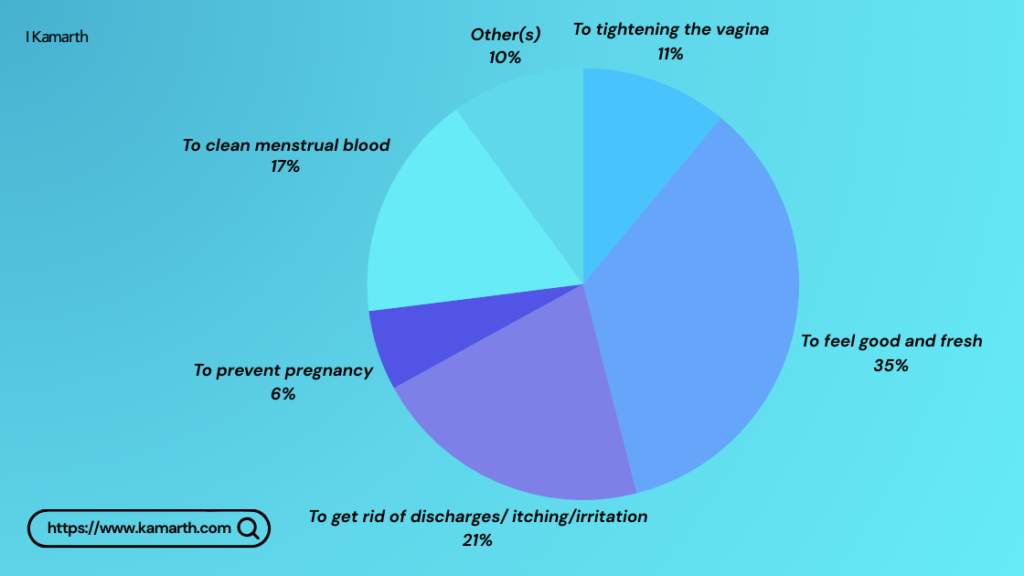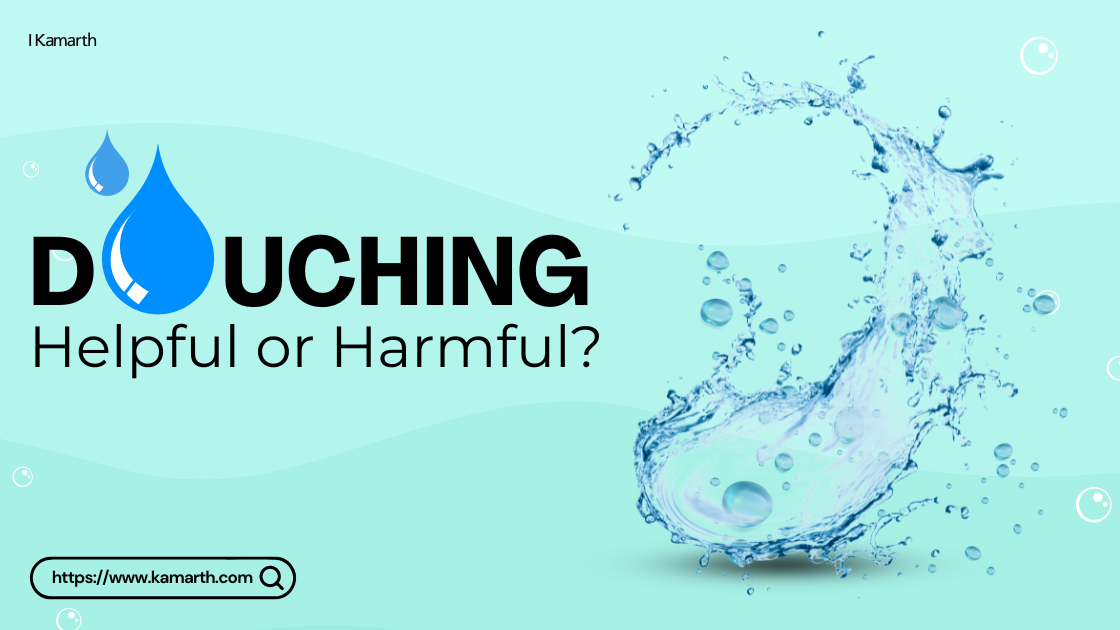Douching – In today’s scenario, women prefer to live odor-free, hygienic, and in a state of mind where they consider themselves to be clean, especially after mensuration or intercourse, and as a result, sales of women’s hygiene products are increasing substantially. But, are all practices that seem hygienic really helpful? As per the research of NCBI, “Women who douche may have a 73% increased chance of having PID”. Let us explore everything about douching.
Table of Contents
What is douching?
Douching is derived from the word ‘douche’ which means to wash or soak in French. So, douching basically refers to a process in which women do clean their vagina either with water or any other fluids like baking soda, fragrances, vinegar, etc. There are several douche products that are available in the market, some are even sold in the beauty category. Douching is carried out either with a device named douche or with jet sprays. By this process, anyone can wash their vagina or anal. However, the vagina and anal have their own good bacteria which help in maintaining PH level and cleanliness.
Read Also – Endometriosis: Stages, Causes, Symptoms, Diagnosis
Why do women prefer douching?
Douching is something that makes women feel relaxed, and hygienic, especially after mensuration and sexual intercourse. In many cases, cultural and demographic factors also affect the choice to douche or not. Most women’s reason behind douching is the following.
- They do so to feel odor-free
- To remove period blood around the vaginal region
- To eliminate the risk of pregnancy by washing semen
- To reduce the chance of getting infected by STIs etc.
The data shown below displays the percentage of women who prefer douching for multiple reasons. from Health Science Reports

Is douching harmful or helpful?
All these assumptions that, douching eliminates the risk of pregnancy and reduces the risk of getting affected by the STDs (sexually transmitted diseases) are totally wrong. Douching can lead to elimination of good bacteria from the vagina’s environment. It also breaches the microbial environment of the vaginal region and thus shoots up the growth of infectious bacteria. The balance of both good and bad bacteria helps in keeping an acidic environment, which protects the vagina from various infections.
Also, if the person already having any vaginal infection does douching then the bacteria causing that infection can lead to the uterus, and ovaries passages and cause pelvic inflammatory diseases, a severe health issue. Douching timing is very crucial as during ovulation, the levels of circulating estrogens go up, and cervical mucus becomes cleaner. Hence, the risk of getting infected is highest during that time.
Read Also – Irregular Ovulation – Signs, Symptoms, Causes & Treatment
What health issues are linked to douching?
There are several doctors, and professionals, including the American College of Obstetricians and Gynecologists who consider douching a harmful practice, as it might lead to health issues like bacterial vaginosis, in which females douching more frequently, like once a week have 5x higher chances to get affected by it. About 16% of pregnant women are affected by it. Also, pelvic inflammatory disease caused by STIs can build its home in the reproductive organs, doubling PID’s risk by 73%. It also leads to issues during pregnancy, which comprises pre-mature delivery. Even STIs and HIV chances increase. Some females also feel vaginal irritation and dryness because of this.
The rate of women who perform douching practices in their vaginas is the frequency of it, the varying rates of douching among females as found in various studies, are between 38.0% and 70.0%. This shows that between 38% and 70% of women in various populations have reported the practice of vaginal douching in Turkey. Besides, some studies specifically conducted in Turkey indicated figures ranging from 50.2% to 61.5%.
Learn More – Is Masturbation good or bad? – Benefits, Addiction, Disadvantage
What is the alternative to douching?
Females do face this issue of how to remove odor, and other vaginal problems like itching, pain, etc. The vagina is a self-cleaning organ that doesn’t require any external device, it creates mucus to clean itself by removing the blood, semen, and other discharge. For the vaginal odor, one should consult the doctor, but it’s totally fine and okay to have a mild odor for a healthy vagina.
It’s better to clean the vagina from the outside only with warm water while taking a bath. If you are not having any infection or sensitivity, you can use mild soap as well. It’s also better to avoid scented pads, condoms, and sprays, as they might lead to severe infections. Also, one can prefer soft and breathable cotton underwear and avoid fabrics such as silk, satin, and polyester. These materials may become moist and the bacterial growth follows. Make sure the vaginal area is dry enough to avoid moisture. Do not apply harsh cleansers or deodorizing products to the vagina.
Read Also – Female Condoms – or Internal Condom, How to Use
When to consult a doctor?
It’s always recommended to connect with your doctor if you are facing a problem with thick, greenish, or yellowish discharge. Also, when an unpleasant vaginal odor, itching, irritation, or burning sensation happens in the vaginal region or recurring untimely or unusual bleeding takes place, better to go for a health expert’s advice in such cases.
Learn More – Teenage Marriage – Cause, Implication, Why should it stop?
A note from kamarth
Vaginal douching is something prevalent in society for a longer period of time. Many might not know the name ‘douching or douche’ but they have followed the process, that’s why it’s hard for everyone to understand the health risks of it. Pregnant women are advised not to douche because it can increase the risk of premature birth. There are several studies that show it’s responsible for harming the vagina’s flora. Hence, leads to several infections, so it’s always advisable to consult a medical expert for help. It can interrupt the vagina’s natural self-cleaning process. Raising awareness about vaginal health and douching is something really important, by having open discussions about the same.
Read Also – Non Hormonal Birth Control Pills – How it work, How to Use
Some Additional Doubts
Question: What should I do if I experience an unusual vaginal odor?
Answer: It’s recommended to consult a healthcare expert, as it might sometimes be a case of vaginal infection.
Question: Is there any impact of douching on fertility?
Answer: There are some researches that suggest that douche can have a negative impact on the fertility of an individual.
Question: What are the substances that are most common in all douching solutions?
Answer: In the market, there are several products of douche that mostly comprises water, baking soda, vinegar, and even antiseptic solutions, but all these can imbalance the vagina’s natural environment.
Question: Is there any specific condition where douching is recommended?
Answer: It’s not recommended by most medical experts but for any sort of specific health condition, it’s always better to consult an expert.
Question: What’s an alternative to douching?
Answer: One can clean the vaginal area by just washing it with warm water and mild soap (only if not having sensitive skin).
Read Also:
Unlocking the Power of Foreplay: Why It’s Important and Surprising Benefits
Masturbation: Benefits & Why People Do It
Miscarriage – Critical Prevention, way to Diagnosis, and Effective Treatment
Is Breast Size Matter? – Is bigger best, types
Male Condoms: Your Ultimate Barrier Against STIs & Pregnancy
Reference links:
https://www.womenshealth.gov/a-z-topics/douching
https://timesofindia.indiatimes.com/life-style/health-fitness/health-news/ladies-stop-douching-it-is-harming-your-vagina/photostory/97730344.cms
https://www.healthline.com/health/womens-health/what-is-a-douche#prevention
https://www.mayoclinic.org/symptoms/vaginal-discharge/basics/when-to-see-doctor/sym-20050825
https://www.medicalnewstoday.com/articles/320998#why-are-douches-used
https://www.webmd.com/women/vaginal-douching-helpful-or-harmful
https://www.jognn.org/article/S0884-2175(15)34031-4/pdf
http://www.aascit.org/journal/archive2?journalId=908&paperId=793
https://www.ncbi.nlm.nih.gov/pmc/articles/PMC1380899/
